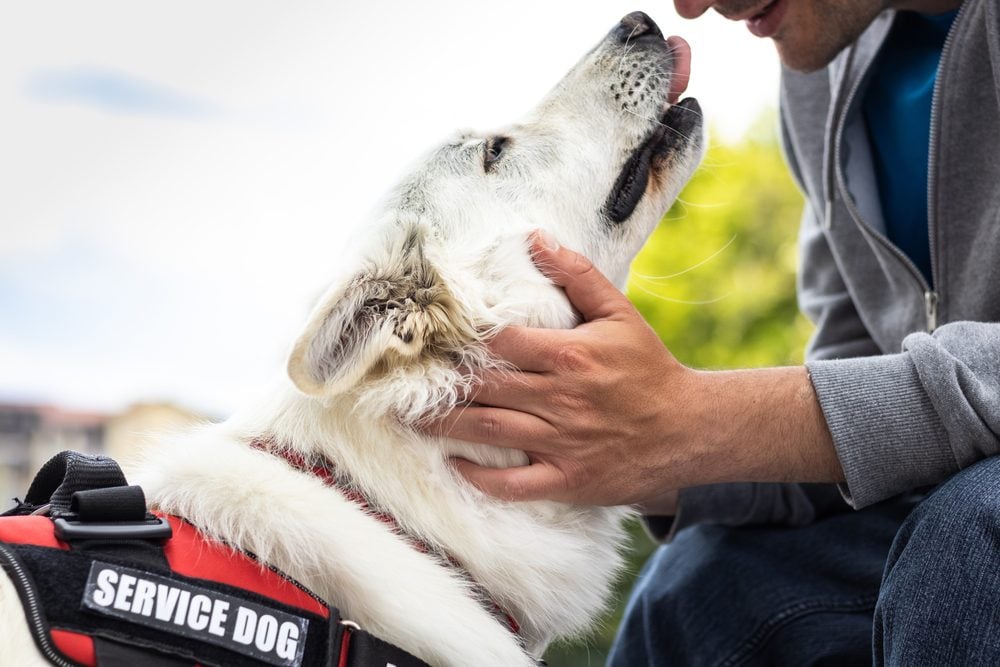Anxiety is the most common mental illness in the world, affecting over 40 million adults in the United States ages 18 and older. There are many medications, remedies, and treatments available for this condition, each with their own benefits and drawbacks. The correct treatment method will depend on the exact circumstances and severity of the condition.
Although this widespread epidemic is highly treatable, only around 35% of Americans who are affected actually receive treatment. This is partly due to the fact that many feel there is a stigma associated with seeking treatment for mental or emotional disorders.
However, anxiety can be very serious, and it should never be ignored. If you believe that you or a loved one is suffering from anxiety, you should consult a licensed physician or mental healthcare provider immediately to get a diagnosis and, if necessary, determine a treatment plan that meets your needs.
Sometimes, service dogs are utilized to treat anxiety and the symptoms that come with this mental health condition. Our article gives you more information about service dogs for anxiety and how these wonderful canine companions can help individuals cope with their anxiety.
What Are Service Dogs for Anxiety?
Service dogs are dogs that have been specifically trained to help with physical, mental, or psychiatric disabilities and provide their owners with the assistance needed to go about their daily lives. A service dog for anxiety specifically performs at least one task to help their handler cope with their anxiety symptoms.
According to the Americans with Disabilities Act (ADA), service animals are defined as follows:
“Service animals are defined as dogs that are individually trained to do work or perform tasks for people with disabilities. Examples of such work or tasks include guiding people who are blind, alerting people who are deaf, pulling a wheelchair, alerting and protecting a person who is having a seizure, reminding a person with mental illness to take prescribed medications, calming a person with Post Traumatic Stress Disorder (PTSD) during an anxiety attack, or performing other duties. Service animals are working animals, not pets. The work or task a dog has been trained to provide must be directly related to the person’s disability. Dogs whose sole function is to provide comfort or emotional support do not qualify as service animals under the ADA.”
What Laws Protect Service Dogs for Anxiety?
Thanks to the ADA, service dogs are granted certain protections by law. Many of these protections relate to where you can and cannot go with a service dog, as well as which questions certain people can and cannot ask about your condition.
A service dog must be allowed to accompany their handler in any place where the public is typically allowed to go. Typically, the only exceptions are places like operating rooms (though they can be in most areas of a hospital), where things need to be kept extremely sterile. However, they are still allowed in places that serve food, regardless of local health codes.
Additionally, the ADA provides the following information related to questions that landlords, hospital staff, and others can ask of you, as well as certain exceptions to the aforementioned rules:
- When deciding whether or not public access should be granted, people are only allowed to ask if the service animal is required due to a disability, and what work or task they have been trained to perform to help with that disability. They can’t ask for identification for the service animal, certifications, or any proof of your disability.
- A fear of dogs or allergies to dogs are not valid reasons to refuse access to a service dog. Ideally, the person who cannot be around a dog and the dog itself should be kept in different areas of the building. However, neither person is allowed to feel isolated or like they are in a lesser part of the premises.
- A service dog can only be asked to leave a premises if the dog is aggressive or destructive, or if the dog is not housebroken. If the dog must leave, the staff of the premises must offer to handler the chance to remain without their service animal present.
- A person with a service dog cannot be kept isolated from other patrons, cannot be treated less well than other patrons, and cannot be charged any fees that those without animals are charged. All required deposits for animals but be waived as well, though a handler may still have to pay for any damages their service dog causes.
- The staff at any premises are not required to provide food, water, or care to a service animal.
Service dogs are specifically trained to help make the day-to-day life of their owner better and alleviate the burden of their condition. These animals can help with different aspects of everyday life for their owner, from retrieving hard-to-reach items to physically supporting a person with impaired motor skills.
Since they must provide excellent support round the clock, service dogs are truly put to the test. They have to make it through extensive training before they can officially become a service dog. This helps give individuals some peace of mind, knowing that their companion is extremely well-trained and reliable.
Service dogs are typically used by individuals with hearing or visual impairments, but those suffering from depression or anxiety can also utilize these furry companions. However, not all dogs can become service animals. The most common breeds are Labs, Golden Retrievers, and German shepherds, but they will also need to meet certain standards and undergo the proper training.
How Do Service Dogs Help Those With Anxiety?
Service dogs that help with mental health conditions are typically referred to as psychiatric service dogs (PSDs). Service dogs for anxiety are generally considered PSDs, and they are trained to complete tasks such as bringing medication or water to their owner at the first sign of an anxiety attack.
Service dogs for anxiety may lead someone to their owner to help with an emotional crisis, or bring a phone during an anxiety attack in order for the owner to call their therapist or support person.
Additionally, service dogs for anxiety provide love and comfort, often with tactile support such as licking their owner’s face or applying pressure to their owner’s chest or abdomen to disrupt an anxiety attack. Companionship can also help release tension and ward off a panic attack by letting the owner know that they are not alone.
Other tasks that a psychiatric service dog trained to help with anxiety can complete include:
- Detecting signs of anxiety attacks before they begin.
- Retrieving water, medications, or other items that provide comfort during the attack.
- Getting someone to help if the owner is in distress.
- Warding off strangers if the owner is in distress.
- Distracting the owner during an anxiety attack to help calm them down.
- Providing physical pressure to help soothe their owner.
All service dogs are trained to help with their owner’s specific needs and the tasks that will assist their owner the best. If you need help with a task that isn’t on this list, don’t worry – it very likely can be trained into the service dog you end up adopting to help with your anxiety.
How to Get a Service Dog for Anxiety
If you suffer from anxiety or another mental illness, a psychiatric service dog may be the right treatment for you. Whether your anxiety is debilitating and something that hinders your everyday life, or you have a milder disability, it’s a good idea to talk to your doctor to discuss the possible treatment options that could be right for you.
To get a service dog, the owner must meet several criteria. First, you will need to see a physician to request the recommendation needed to apply for a psychiatric service dog to aid with your anxiety. There are specific requirements in place that the individual must meet before they can bring home a service dog.
- You must have a physical disability, specific illness, or disorder.
- You need to be present during your dog’s training.
- You must still be able to give commands and care for your dog.
- Your home environment must be stable.
- You need a recommendation letter from your healthcare provider.
- You must have the necessary finances to care for the dog.
Dog owners must be able to command and care for their service dog independently and provide a stable home environment for their animal. Often, owners are required to be a part of their anxiety service dog’s training as well.
How Much Does an Anxiety Service Dog Cost?
The help provided by an anxiety service dog may be invaluable to you, but these companions can be expensive; training for a service dog could cost anywhere between $30,000 and $40,000. On top of this cost, you have costs of food, grooming, and veterinary visits each year.
That being said, several organizations exist to help individuals receive service dogs at little to no cost through fundraising. So, if the cost of a service dog is an issue for you, you aren’t immediately ruled out.
Can Your Dog Become Your Anxiety Service Animal?
It may be possible to train your dog to become your anxiety service animal. Many individuals choose this option to help save the cost of purchasing a trained anxiety service dog outright and to teach their dog specific tasks that they will need help with for their anxiety. To get started training your own PSD, you can see if you qualify for our online PSD training program.
What Breeds Are Best for Anxiety Service Dog Work?
Technically, any breed can be a service dog for anxiety, as long as they have the right temperament and physical traits to perform whatever tasks you need. For instance, if you need a dog who is able to guide you out of a crowded building, you’ll want one that is independent enough to find their own way, and large enough to pull you out if needed.



Emotional Support Dogs for Anxiety
Emotional support dogs are different from service dogs, as they are not specifically trained to help with anxiety-related tasks that an individual may be struggling with. Instead, emotional support dogs provide relief from anxiety by simply comforting their owner with their presence and providing a sense of routine.
If you don’t qualify for a service dog for anxiety, which is a dog that is trained to perform tasks directly related to your disability, then you may be able to acquire an emotional service dog. Speak to your licensed medical provider or mental healthcare provider for more information about adding an emotional support dog to your anxiety care plan.
Acquiring a Service Dog for Anxiety
There are significant benefits to having a service dog if you suffer from anxiety. If you are looking for a way to feel a bit more independent, a service dog is a major step in the right direction. Additionally, service dogs can perform vital tasks such as retrieving items, alerting others in the event of an emergency, and perhaps most importantly, providing companionship and emotional support.
That said, not everyone who has been diagnosed with an anxiety disorder will qualify for a service dog. You will first need to consult with a physician who is familiar with your condition to determine if a service dog is the right treatment option for you. If not, you might also consider an emotional support animal, as they can provide similar assistance, without the high costs and training process.
Let Us Help You Get a Service Dog for Anxiety



If you and your doctor agree that a service dog could benefit you and help alleviate some of the suffering caused by your anxiety, then you can continue the process of obtaining your animal. That’s where we come in. The experts at usserviceanimals.org know how much a service dog can mean to someone in need.
Additionally, we understand the legal process that you must go through to qualify for one of these animals, and we can help you every step of the way. To learn more about qualifying for a service dog, or if you simply have questions about how these animals can benefit you or a loved one, feel free to contact us directly.
